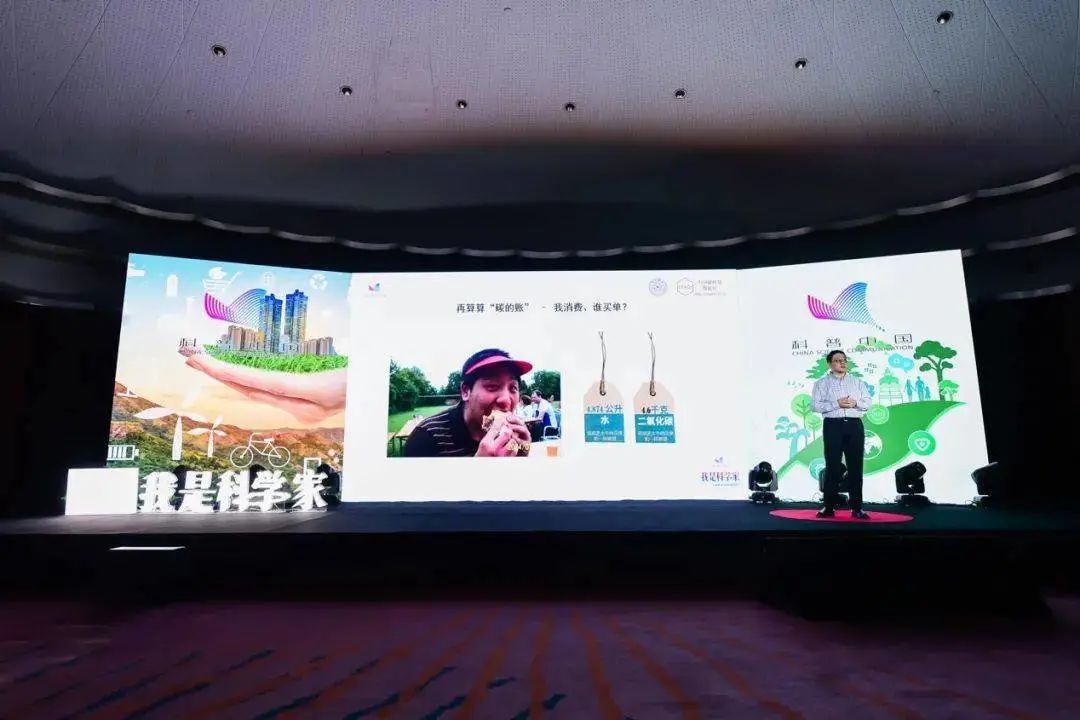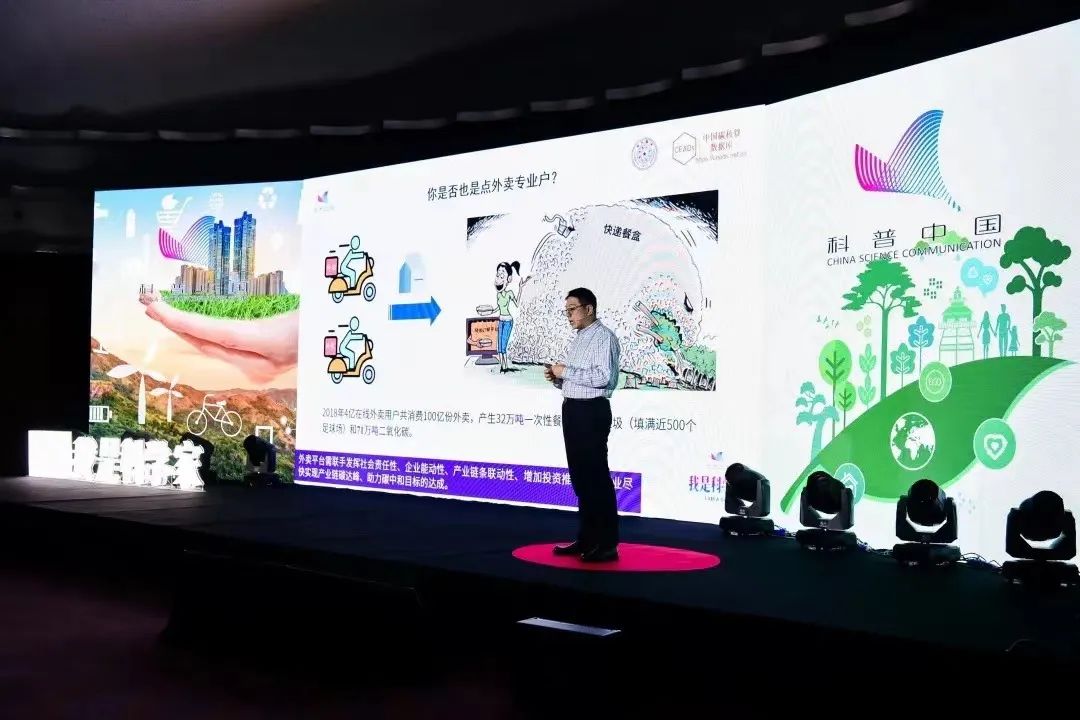Add:1506,Tower West,Jinrun International Plaza,No.85 East Nanxijiang Street,Jianye District,Nanjing,China,210019
Tel: 025-58866358
025-58933315
Fax:025-58867358
E-mail:info@bonagrain.com
Global warming, carbon footprints, the 2-degree limitation for temperature growth … all those abstract terms are vividly brought to life in Guan Dabo's lecture.
In addition to his academic research and teaching work, the climate change economics professor from the Department of Earth System Science at Tsinghua University, has made a point of "preaching" to the public.
"I'm a strong believer in environmental protection being up to every individual," Guan says.

▲ Guan Dabo addresses the audience as part of a multimedia campaign to boost public understanding of science. Photo/Vphoto
His speech last year on I Am A Scientist, a multiplatform series of online articles and videos that is organized by the China Association for Science and Technology, enabled the audience to better understand how carbon consumption matters and relates to their own lifestyles.
"Since the industrial revolution, the burning of fossil fuels has released a lot of carbon dioxide into the atmosphere," Guan says, adding that the country's economic system is vulnerable to climate change.
"If we want to reduce the risks, we need to limit global warming to 2 or even 1.5 degrees by the end of this century," he adds.
Climate change could lead to a sharp decrease in rice, coffee, chocolate and beer production, Guan says.
"When we use carbon as a yardstick for understanding human activities, we realize that the dynamic process of carbon neutrality involves the issue of carbon accounting," he says.
The complexity and influence of the issue was what initially piqued Guan's academic curiosity and drove him to look into the field.
"Academic work is probably the same as any other job, and it has to be interest-driven," Guan says.
He noticed the importance of environmental protection in his childhood, when he lived near a pharmaceutical plant.
"There was a pungent odor," he recalls.
In 2000, he chose to pursue environmental management with science at the University of Leeds in the United Kingdom, and went on to obtain, by 2007, a PhD in ecological economics.
"I am naturally drawn to the environment, which is closely connected to our life," he says.
"The sustainable development, and interdisciplinary exploration between the environment and economics is just fascinating."
He used to discuss, with other scholars, which food was most likely to be the first to disappear due to climate change. This led him to write a paper about climate change and a shortage of beer. The paper received the 2018 Altmetric Top 100 award and was one of the most "talked about" climate change-related papers, according to the public response.
"It derived from my interest, and the work was aimed to help the public understand how climate change matters in every aspect of our daily lives," he says.
Those experiences paved the way for Guan to make inroads into environmental studies in China. He joined Tsinghua University as a distinguished professor in 2019.
To date, he has published more than 260 articles, including over 60 in Nature, Science and other leading journals. His paper for the Environmental Science & Technology journal won the award for Top Policy Paper in 2007 and the Washington-based Proceedings of the National Academy of Sciences Cozzarelli Prize 2014.

▲ The professor believes that environmental science can help policy makers in their work. Photo/Vphoto
For developing countries, peaking carbon emissions means the decoupling of economic and social development from fossil resources, and carbon neutrality is complete independent from such resources, Guan explains.
"Since 2010, China has begun to vigorously optimize its energy and industrial structures, and the use of coal has declined significantly. As a result, carbon emissions have now reached a plateau where fluctuations are small," Guan says.
In Guan's opinion, environmental science can help point the way for policy makers.
"For example, if we find human intervention is required when we study water and oceans, we have to bring this to the attention of social and economic scholars and help them understand the issue before pertinent policy can be made and implemented," Guan says.
In late October, Guan and his team rolled out the Carbon Dioxide Emission Accounts of Global Emerging Economies 2022.
The report covers 50 emerging economies and aims to offer a consistent, transparent and scientific calculation system for them.
The smallest and least developed countries have enormous potential to emit carbon dioxide. While the pandemic has slowed the growth of their emissions, it cannot prevent such countries from becoming the next "giants" of emissions as a whole, says Guan, who led the work on the report.
"In global climate governance, China should play the role of a bridge between developing economies, and fully explore the potential of small countries to reduce or slow down emissions, reflecting the meaning and value of the 'human community with a shared future'," Guan says.
The report aims to establish data infrastructure and a scientific basis for advocating South-South cooperation in global climate change mitigation.
"It realizes its goal through innovative, independent data collection methods," says Zeng Rong, vice-president of Tsinghua University.
"Climate change is one of the major global challenges facing mankind. President Xi Jinping has pointed out that we should actively and steadily promote carbon peaking and carbon neutrality, accelerate the planning and construction of a new energy system, and actively participate in the global governance of climate change," Zeng says.
China's commitment to carbon neutrality is an important contribution to global climate change mitigation efforts and is as significant as the impact of the three industrial revolutions had on the course of history and social development, experts say.
"This is a really critical resource," says D'Maris Coffman, professor of Economics and Finance of the Built Environment at University College London.
"We all recognize that we have to find growth pathways to decarbonization for emerging economies, but the reality is that we didn't actually have the data to assess what this means in practice until professor Guan Dabo undertook the assembly of this data set," Coffman adds.
Therefore, this critical resource can inform not only academic research and outreach in terms of assessing the reality of emerging economies meeting their climate targets, but more importantly, it can go directly to policy discussions, she says.
Guan says that, in the coming years, his team will continue to update the report to cover carbon dioxide emissions of more developing countries.
In September 2020, China announced that it will strive to bring its carbon emissions to a peak before 2030 and become carbon-neutral before 2060.
"We only have 30 years for the transition, while it is 40 years for the United States and more than 70 years for European Union countries," Guan says.
"It means that it will be more difficult for us to reach our goal of carbon neutrality and more effort will be required," Guan says.
As to what specific things people can do to reduce carbon emissions, Guan suggests the use of recyclable tableware in the fast-food industry.
"This way, plastic packaging waste can be reduced by 92 percent," Guan says.
"For example, silicone tableware can be reused 14 times to offset the major environmental impact of disposable tableware."
Guan also calls for changes in the fashion industry, where textile production, dyeing and tailoring produce pollution.
He suggests introducing a low-carbon concept to the industry.
"I hope everyone can adjust their lifestyle to help our country reach carbon neutrality," Guan says.
(from:CHINADAILY)


